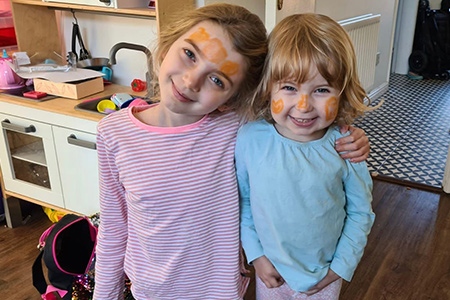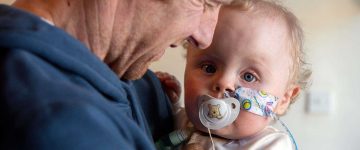Jess and Tom are parents to 4-year-old Florrie, and 8-year-old Lucy. Just before Florrie’s first birthday, the family found themselves in a particularly unexpected and unique situation.
Approaching her first birthday, Florrie had a slight walking delay, so Jess and Tom took her to their GP and were then referred to a paediatrician who decided to do some chromosomal testing to rule anything out. The tests showed that Florrie has a chromosomal change called Monosomy 7, which is normally found in children who have active leukaemia. They did further testing and found another leukaemia related mutation. This came as a huge shock to the family as Florrie had no signs of leukaemia at all, and her bone marrow was completely fine. This meant that Florrie would likely develop leukaemia, but they did not know when.
Florrie had a year of monitoring before she contacted a bad respiratory infection in November 2021, and after this her platelets started dropping and her bone marrow biopsy showed that she had started to develop myelodysplastic syndrome (MDS), a very rare type of blood cancer which affects the ability of the bone marrow to produce enough healthy blood cells. However, Florrie still was not showing any symptoms. Jess said:
‘It was a really bizarre way of finding out that your child has cancer. It was the first time any of her doctors had come across a situation like that’.
The only cure for MDS is a stem cell transplant, also known as a bone marrow transplant. Jess and the family were getting ready for Florrie to go to transplant when a routine bone marrow biopsy showed that Florrie’s MDS had developed into Acute lymphoblastic leukaemia (ALL). This meant she could not go for transplant because they needed to deal with the ALL leukaemia first. Florrie had to undergo chemotherapy for around 6 weeks before her transplant in mid-May 2022.
Jess says:
“We had a really rocky ride up to transplant; it was pretty horrific. It is very unusual for MDS to evolve into ALL leukaemia, and it took us and her medical team completely by surprise. There were no protocols to follow, and we had to trust that the treatment they devised was going to work. Thankfully, the initial chemotherapy treatment was effective in controlling the ALL leukaemia. This allowed her to proceed to an umbilical cord transplant on the 20th of May 2022 following 10 days of high dose chemotherapy conditioning. The conditioning essentially wiped out her previous immune system, leaving space for a brand-new immune system with hopefully no memory of her previous cancer.”
Because of the transplant Florrie had to remain in an isolation room in hospital where she stayed for over 3 months while her immune system recovered. Jess and her husband, Tom, took it in turns to be with her, switching once a week. Jess describes this as a very ‘intense’ time.
‘It was a huge thing to deal with. Normal life is completely uprooted. Tom and I had to stop work for several months. It was several months where Lucy would only see one of us at a time and there were no opportunities to be together as a family.
Family life completely changed for them all. Jess and the family had to be particularly careful after Florrie’s treatment because of the risk of any infections, and Jess described how they were not able to see many friends during this time. As well as this, Florrie is not able to mix with other children, go into busy places such as shops and cafes, or go to preschool. Jess explained the impact Florrie’s diagnosis and treatment had on both her own mental health, and that of her family:
‘Our mental health did suffer; it’s been a hugely anxious time. The anxiety doesn’t really go away, even though she’s a year through transplant, and in a good place, she could relapse at any moment. We are living blood test to blood test. There are huge amounts of anxiety and uncertainty, but I think you do get a little better living alongside that the longer your journey has been. But there have been some really low points.’
Throughout Florrie’s diagnosis and treatment, Jess and Tom have tried to keep a sense of normality for Florrie and her sister Lucy. Lucy is 8 years old, and Florrie’s illness has been quite unsettling for her at times.
‘It's been quite hard on Lucy. We have protected her from the seriousness of the situation. But she is a very perceptive child, and she can always tell when Tom or I are upset. It can be quite unsettling when one of us has to be in hospital with Florrie for long periods and the family is split in two.’
‘When you have a child with cancer, they naturally need a lot more attention, and a big proportion of my time is spent managing Florrie's medical needs. But I think Lucy as a result can feel a little left out. She doesn't always understand the support Florrie needs and naturally can feel some jealousy at times.’
Jess and her family were referred to Rainbow Trust by a family friend and started receiving support from Family Support Worker Cindy in January 2022. Cindy provides the family with sibling support for Lucy, providing 1-1 support where Lucy can talk about her worries or anxieties, or simply just have fun.
‘Cindy will do whatever Lucy wants to do on that day. Sometimes that's art and crafts, other times it's visiting the park or going out for ice cream. It's been great and they have built a really lovely relationship. Lucy adores Cindy and looks forward to every single visit. It's not just 1:1 time but it's an opportunity for Lucy to talk about any of her worries or concerns with someone not directly involved in the situation. It's something just for her.’
Jess describes the difference that having Rainbow Trust’s support has made to their family’s lives:
‘It's lovely to think that there’s people out there that care about us and want to support us through this. It can be an extremely isolating journey and it’s really special to have someone involved who understands what we’re all going through as a family.’
‘We are just so appreciative that someone can have that bond with Lucy and support her through this, because as parents you do your best, but you do worry that you’re not doing enough - it’s just really special.’
Please donate today to help us support more families like Florrie's.


